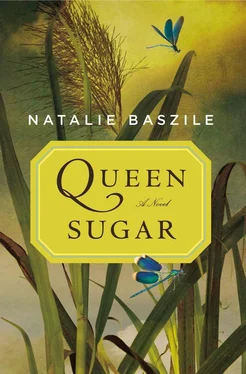“Not fast enough,” she said, and pushed thoughts of her low bank balance out of her mind. “This is the hardest thing I’ve ever done,” she said, then added, softly, “Well, the second hardest.”
“The first?” Remy said.
“Raising a daughter.”
Remy nodded, and seemed to consider Charley’s answer, but he didn’t probe.
They crossed the bayou again as the road turned, and lost the radio signal. Remy toyed with the dial till he found a zydeco waltz; the melancholic whine of the accordion, the singer’s voice full of resignation and longing, wafted through the speakers.
Remy sang along for a few bars. “You speak French?”
“I wish,” Charley said, thinking of Micah. “Just some high school Spanish, and even that leaves a lot to be desired.”
For a while, they discussed the benefits and challenges of hiring migrant farm labor, the rising price of health insurance and workman’s comp, but eventually, just as Charley knew it would, their conversation turned to the subject of marriage and family.
“You have just one?” Remy asked.
“Just one.” Charley scrounged through her purse for the single picture she carried: Micah leaning against a bright red door, grinning with permanent teeth that looked too big for her mouth. Charley handed the picture over. “She’s eleven.”
Remy steered with one hand as he held the photograph up to the window. “She’s a pistol, I can tell.”
“You have no idea.”
He studied the picture again, then looked at Charley. “Where’s her daddy?”
Remy was so easy to talk to that Charley was surprised the subject of spouses hadn’t come up before now. “He died four years ago,” Charley said. “We were coming back from the movies and two guys tried to mug us. He tried to be the hero but they had guns.”
“I’m sorry.”
Charley slid Micah’s picture back into her wallet. With every passing day, that other world, her old life, felt as though it belonged to someone else. Three and a half months and there was so much about it she’d forgotten. Charley looked at Remy again. His hair was thicker than she’d noticed and the tops of his ears were sunburned. “What about you?”
Remy drummed the wheel with his fingertips. “Divorced,” he said. “Didn’t last long. She said she didn’t get married to be a farmer’s wife.”
“What did she want you to do?”
Remy shrugged. “Business, I guess. Management, sales — hell, even politics, not that I have the stomach for it; I don’t think she cared as long as it didn’t have anything to do with farming.” He looked out the window, forlornly. “But I’ve worked around cane since I was sixteen. You name it, I’ve done it. It’s who I am. Used to come home from college every weekend during grinding just to smell the burned sugar in the air.”
“Kids?”
Remy shook his head then wiped his face on his shirtsleeve. “Maybe one day, if I’m lucky.”
• • •
Paul’s Café was a tiny joint that sat back from the road. The parking lot was jammed with pickups, and the sign over the door read NO DANCING ON TABLES OR BAR. It looked as if it had always been there.
As they parked, Charley looked at Remy with concern. Music echoed faintly across the parking lot and a cheer went up. Charley frowned. “I have a bad feeling.”
“Trust me, California,” Remy said. He took her hand and gently eased her out of the truck. “All folks in there care about is how much you tip the bartender and how well you dance.”
• • •
Charley was relieved to see that the crowd was a comfortable mix of blacks, whites, and everyone in between. In one corner of the dance floor, a middle-aged colored man of uncertain lineage wearing a cowboy hat with a turtle’s head mounted on the headband swung a white woman whose freckled skin had lovely orange undertones and whose red hair was streaked with silver. An elderly Cajun couple, eyes closed, wrinkled hands pressed together, waltzed gracefully around the edge of the crowd to a melody only the two of them seemed to hear. Men in jeans and vests, girls in short, twirly skirts and boots; husbands and wives, uncles and widows, undergrads and retirees — they were all dancing, everyone shuffling and stomping and two-stepping, their troubles temporarily forgotten.
For a while, Remy and Charley sipped beers at the bar and watched the dancing. Then Remy grabbed her wrist. “Come on,” he said, pulling Charley off her stool, excusing himself and begging people’s pardon as he pushed his way, politely but firmly, to the middle of the dance floor. Remy took Charley’s hand, wrapped his arm around her waist, then patiently guided her through a series of intricate steps, first turning her this way and then the other, then spinning her out on the length of his arm like a fly at the end of a fisherman’s reel before pulling her back.
The band played one upbeat tune after another, and Charley worked to follow the steps. It wasn’t difficult — just step together step, back, then front — but she had to concentrate. The moment she took her mind off what she was doing, looked at another couple, how they moved together, changed it up, she got confused and stumbled.
And then, just as she was getting comfortable, just as she reached the point where she could anticipate Remy’s next move, the band threw her a curveball and downshifted to something slow. It was a sweet, lilting melody with an old-timey feel: Spanish moss, low-hanging mist, and pirogues slipping through the water. The accordion whined and the leader sang in French.
“This here’s my song,” Remy said, starting to sing softly. He took Charley’s hand again, pulled her close. So close that she felt where the front of his shirt was damp from dancing; so close she felt his breath on her ear and neck as he exhaled and she smelled his citrus muskiness.
But every time Remy moved one way, she moved the other.
“Sorry,” Charley said for bumping into him. “Sorry,” she said for stepping on his feet.
“It’s all right. Just relax.”
They knocked knees.
“Oh my God. I’m sorry. I swear I’ll get this.” Charley’s back and shoulders tightened. She started to sweat.
Over and over. She kept messing up and apologizing, until finally, Remy pulled his cheek away from Charley’s just enough to look at her. He caressed her face and gave her that long, careful stare, then, in a calm, steady voice, said, “Listen to me, California. I know you’re a strong woman and all, but you need to let me lead.”
Charley’s heart stopped. Let him lead. Let him lead. Yes. She could do that. For once in her life — okay, for ten minutes — she didn’t have to be the boss or the handyman or the plumber or the activity planner. Or the short order cook, or the chauffeur, or the banker, or the disciplinarian.
“Okay,” Charley said. “I’ll try.”
Remy pulled Charley close again and her shoulders relaxed. He pulled her closer still, so that his face was right against hers, his chest right against hers, and she felt the vibration of his quiet humming. The band played two slow songs in a row, and she tried to let go of everything but the music and the feel of Remy’s body, solid and strong, moving with hers.
The set was over. The band took a break. Remy led Charley to a covered patio where strings of white lights draped like vines and darkness was broken only by a handful of torches staked in the grass. They ordered waters along with their beers, and then, because all the tables were taken, sat on the edge of the patio, where they heard insects chirping and frogs croaking along the bayou.
“Tell me one interesting thing about you,” Remy said. “Something I wouldn’t guess.”
Charley looked at her beer. She had never thought of herself as interesting. Stubborn? Yes. Impulsive? Possibly. Patient? She was trying. But interesting? Charley sipped her beer and wondered if Remy would understand what she found interesting. But Remy was looking at her, waiting, so she gave it a go. “There was a little girl who came to the art class I taught. The neighborhood was pretty scary, but this girl, she was in the sixth grade, she drew like Raphael. You’ve never seen anything like it. Kids would be throwing markers at each other or drawing monsters or coloring the sky blue and the trees green, you know, stuff you expect kids to do in art, and she’d draw cities. Or women sitting on park benches, looking like angels.” Remy was watching her closely, so Charley reeled out a little more trust and said, “You have to be able to see with different eyes to draw pictures like she drew. You have to see past what’s right in front of you.” Charley paused, thinking about the girl.
Читать дальше












